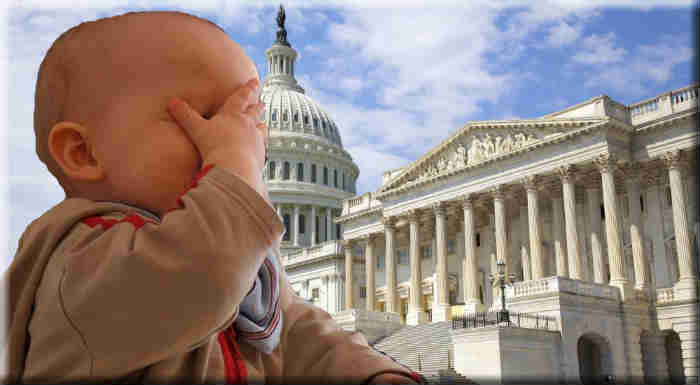By Dan Calabrese ——Bio and Archives--November 17, 2017
American Politics, News | CFP Comments | Reader Friendly | Subscribe | Email Us
 I'm really not surprised at this poll outcome given the tenor of our times. Democrats and the media have been pounding away for decades with the idea that if it's good for rich people and corporations, it's bad for you. And very few Republicans have offered effective rejoinders to this idea since Ronald Reagan left the stage.
The frustrating thing is that Republicans have done so little to make the case in the run-up to the current bill being voted on, which means they're essentially shoving a much-improved tax code (although not nearly as improved as it could have been) down the throats of an unenthusiastic nation that doesn't really see why it's necessary. You can blame people for their economic ignorance, and I do, but really, where have the voices been for the past three decades or so making the case for these policies? Jack Kemp? OK. The Club for Growth, kinda sorta. Herman Cain? You had your chance, people . . .
I'm really not surprised at this poll outcome given the tenor of our times. Democrats and the media have been pounding away for decades with the idea that if it's good for rich people and corporations, it's bad for you. And very few Republicans have offered effective rejoinders to this idea since Ronald Reagan left the stage.
The frustrating thing is that Republicans have done so little to make the case in the run-up to the current bill being voted on, which means they're essentially shoving a much-improved tax code (although not nearly as improved as it could have been) down the throats of an unenthusiastic nation that doesn't really see why it's necessary. You can blame people for their economic ignorance, and I do, but really, where have the voices been for the past three decades or so making the case for these policies? Jack Kemp? OK. The Club for Growth, kinda sorta. Herman Cain? You had your chance, people . . .According to the latest Harvard-Harris Poll survey, 54 percent say they oppose the Republican tax reform bill. The same amount — 54 percent — say the GOP plan is more likely to hurt them financially. Three-quarters of Republicans say it will help them financially, while 77 percent of Democrats and 56 percent of independents say it will hurt them. House Republicans are expected pass a sweeping tax reform package on Thursday, moving the GOP closer to fulfilling a key election year promise before the end of President Trump’s first year in office. Trump is on Capitol Hill to rally support for the bill, although there is little doubt that it will pass. There is widespread public support for Congress to cut taxes on individuals and small businesses and to simplify the tax code. Seventy-three percent of voters say they support broad efforts to overhaul the tax code, but the GOP plan is not viewed as the best way forward, the Harvard-Harris survey found.
“There is enormous support for tax reform in the country and the Republicans are close to getting majority support for their bill but are falling short as Democrats have so far successfully challenged whether most people are actually getting a tax cut,” said Harvard-Harris co-director Mark Penn. “Most people think they are not getting a tax cut and Republicans need to fix that to unlock support.” The GOP bill would cut the corporate tax rate from 35 percent to 20 percent while eliminating many deductions for companies. But 58 percent of voters say cutting corporate tax rates will benefit companies more than individuals. Fifty-seven percent say they oppose reducing the corporate tax rate from 35 to 20 percent. Rather, 64 percent of voters say they want to see taxes lowered on small businesses. Seventy-four percent want to see the number of tax brackets slashed from seven to four, an idea that was laid out in the White House tax proposal. And a strong majority — 75 percent — say state and local taxes (SALT) should remain deductible. Sixty percent say they oppose eliminating the ability to deduct state and local property taxes from federal taxes in an effort to raise more money to pay for tax cuts elsewhere.One thing I found interesting about the summation is that it makes no mention of the doubling of the personal exemption. That's going to eliminate a whole lot of people's income from being taxable, which is going to result in a much lower rate in practice than even what the new rates show in the bill. I wonder how many of the people who answered this poll even know that. Given how much attention it's received in the media, I'd guess close to none.
Support Canada Free Press

View Comments
Dan Calabrese’s column is distributed by HermanCain.com, which can be found at HermanCain
Follow all of Dan’s work, including his series of Christian spiritual warfare novels, by liking his page on Facebook.